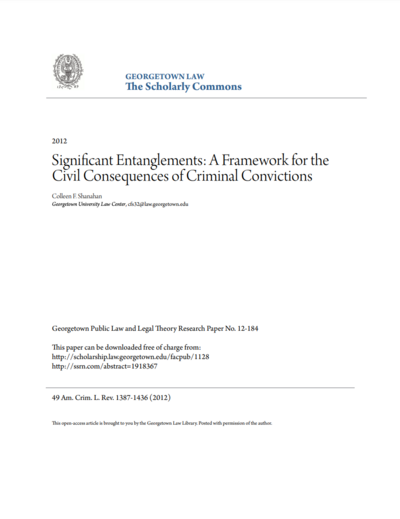Significant Entanglements: A Framework for the Civil Consequences of Criminal Convictions
Journal Article
Clean Slate
Topics:
Collateral Consequences
Criminal and Juvenile Records
Reentry population:
Adults
Date:
Source:
The Scholarly Commons
Significant Entanglements: A Framework for the Civil Consequences of Criminal Convictions
This article, from The Scholarly Commons, discusses the Supreme Court’s decision in Turner v. Rogers creating the opportunity for a more realistic, consistent, and just doctrine of civil consequences of criminal convictions.
The article begins the process of defining this doctrine by suggesting that instead of inquiring into whether consequences are direct or collateral, the test used in the past, courts should inquire into whether these civil consequences are “significant entanglements” of civil and criminal law.
First, courts should analyze whether the civil consequence is significant, in both an objective and subjective sense. Second, courts should examine whether the consequence is entangled with the criminal process. Where significant entanglements exist, corresponding protections should follow.
The article goes on to suggest that the significant entanglement framework can be used to analyze whether Sixth Amendment protections should apply to a particular civil consequence at a particular stage of the criminal process. Further, the significant entanglement framework applies outside the Sixth Amendment to understand the other constitutional protections that may be applied by courts to civil consequences of criminal convictions. Thus, the significant entanglement framework is the next step in developing a new doctrine for the protections that apply to civil consequences of criminal convictions.




